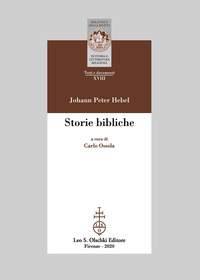
Storie bibliche
2020, cm 15 x 21, xxxii-198 pp.
ISBN: 9788822263537
- About this book
- Reviews (17)
- Authors
- Extra (1)
- E-book
Biblische Geschichten für die Jugend was published in 1824 and was the last work of the great writer – admired by Goethe, and then by Benjamin, Kafka, Hermann Hesse, Elias Canetti, Ernst Bloch, Adorno - who would die two years later. This work was translated in two volumes – but very few copies remain – in Chur in 1828-1829, intended for the reformed communities of the Grisons, and accompanied by the translation of his Christian Catechism, 1831. These writings mark the completion of his project of Erasmian conciliation, a bright lesson in peace that remains valid to this day.
- 08/03/2020 | Sole 24 Ore (Il)
- 20/04/2020 | Blog di Graziana Brancale
- 17/05/2020 | La Sicilia
- 28/05/2020 | Avvenire
- 20/06/2020 | La Civiltà Cattolica
- 24/06/2020 | Il Foglio
- 11/10/2020 | Messaggero di Sant'Antonio
- 06/01/2021 | Quaderni Grigionitaliani 3-2020
- 14/02/2021 | Archivo Teológico Granadino
- 19/05/2021 | Asprenas
- 22/08/2021 | La Provincia di Lecco
- 22/08/2021 | La Provincia di Sondrio
- 22/08/2021 | Altarezianews web
- 22/08/2021 | Intornotirano web
- 09/09/2021 | Concorso letterario Grottammare · (segnalazione web)
- 09/05/2022 | Archivio Storico Italiano · [Lucia Felici]
- 23/08/2023 | Prospettiva Persona
Johann Peter Hebel
Johann Peter Hebel (1760-1826) fu un educatore, scrittore, poeta e pastore tedesco. Le sue Storie di calendario sono considerate da Herman Hesse addirittura come l’opera più riuscita mai scritta da un autore di lingua tedesca. Di fatto tutta la cultura tedesca si è confrontata con questo autore: da Goethe, a Benjamin, da Rilke a Hesse, da Bloch a Adorno a Canetti. Le “storie” narrate riprendono i modi schietti e semplici delle sue celebri novelle ed exempla raccolti nel Tesoretto dell’amico di famiglia renano (1811). Fra le sue opere anche un Catechismo cristiano del 1831.
Carlo Ossola
Insegna al Collège de France, cattedra di «Letterature moderne dell’Europa neolatina». Presso Olschki ha pubblicato l’Autunno del Rinascimento, 1971 e 2014; l'edizione dell'inedito di Carlo Denina, Dell'impiego delle persone, 2020, e delle rare Storie bibliche di Johann Peter Hebel, 2020. - (maggio 2020) -










